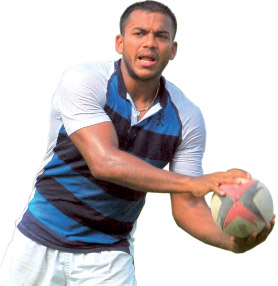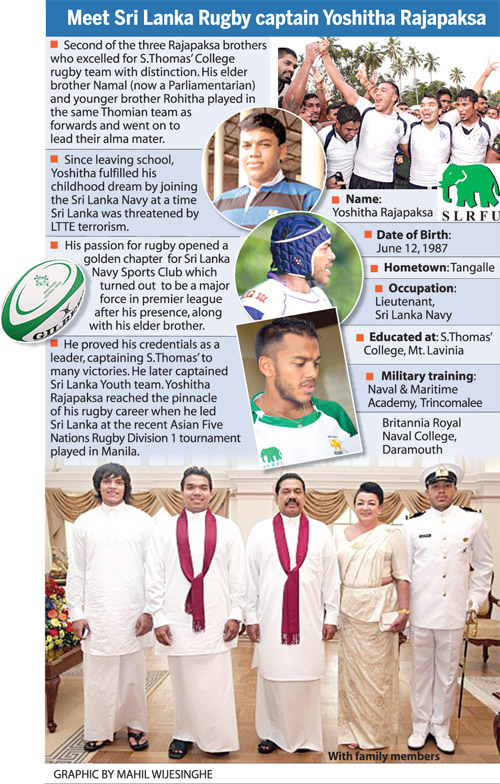|
Exclusive
With professional approach, discipline and
dedication:
SL could become major force in Asian Rugby - Sri Lanka rugby captain Yoshitha Rajapaksa
By Dinesh WEERAWANSA
Sri Lanka rugby captain Yoshitha Rajapaksa is confident that Sri
Lanka would soon regain its lost pride in Asian rugby.
|

Sri Lanka rugby captain Yoshitha Rajapaksa |
In an exclusive interview with the Sunday Observer, the Sri Lanka
skipper said that the present professional approach should enable Sri
Lanka to become one of the strongest teams in Asia behind Japan and
South Korea Ė a position the countryís national team held in late Ď90s.
Skipper Rajapaksa said Sri Lanka has groomed a young side with a
vision for the future and the squad should be in a position to become a
major force in Asian rugby in two years time.
While commending the professional approach given by the SLRFU to the
national squad, Sri Lanka rugby captain said the commitment, dedication
and discipline of the players would take Sri Lanka rugby to greater
heights.
Sri Lankaís young brigade played exceptionally well, beating Taipei
and Singapore by convincing margins and going down narrowly to the
Philippines at the Asian Five Nations Rugby Division I tournament
concluded in Manila last weekend. This is what the captain had to say on
his return home after Asian Five Nations Rugby in Manila.
How do you back and assess your first international tournament as Sri
Lanka rugby captain?
Overall, it was a good success even though we lost the last match to
a team which had highly professional and experienced lot of players.
Comparatively, our team was young and inexperienced as professionals.
Nevertheless, the boys played extremely well and dished out some good
rugby, winning the first two matches convincingly and narrowly going
down in the third game.
Sri Lanka had two good wins over Singapore and Thailand and all of a
sudden your team was trailing 3-23 at the half time of the third game
against the Philippines, which is not a major force in Asian rugby? What
really went wrong?
Though they are rated below us in Asian rugby, the composition of
their new team is strong. I think they had 20 foreigners and one
Filipino in their squad. All of them have been playing professional
rugby for seven to eight years whereas our team has turned professional
only five weeks ago. But we had solid defence which has contributed to
our success.
Donít you think that Sri Lanka would have painted a different picture
if their place kicking had been more accurate?
That was a problem.
It reduced the pace of our game. When we lost advantage and
Philippines got their acts together and gained speed, it became hard for
us to stop them. Nevertheless, we gave them a close run and gave some
anxious moments in the second half.
From here onwards, what is your next target for Sri Lanka rugby team?
I want this squad to maintain its fitness level, remain in good shape
as professionals while absorbing new talent. We should take good care of
the national squad, give them more playing opportunities in the region
with more Rugby Union Tests in between tournaments. We must keep the
players engaged with more exposure.
We will now concentrate on Shanghai and Benonni Sevens which will
serve as qualifiers for 2013 Hong Kong International Sevens. With body
physique and speed, I think Sri Lanka has a better change in
seven-a-side rugby than 15-a-side.
Donít you think that petty club differences have affected the forward
march of Sri Lanka rugby?
I strongly agree with that. For most of the Sri Lanka rugby players,
their club comes first and playing for the national team is a less
important secondary matter.
That is because the players have been looked after by their
respective clubs up to now.
 But the things are gradually changing. Playing for our country is an
incomparable honour and should be the priority at all times. But the things are gradually changing. Playing for our country is an
incomparable honour and should be the priority at all times.
Normally, national player of any Sri Lanka team will have to obtain
permission from the national body to play for clubs. But in rugby it has
been vice versa, the players have to obtain permission from their clubs
when they are called to play for Sri Lanka.
This trend has to be changed. It will change once the players feel
that they are being looked after by the SLRFU contracts.
Donít you think the withdrawal of some Kandy Sports Club players from
the national team affected Sri Lanka? Donít you agree if I say Sri Lanka
would have done better if those Kandy SC players had offered their
services?
To be honest, they are good players. It is unfortunate that they let
the country down. But I donít think we felt their absence, considering
the way our young players played in Manila. Individual brilliance alone
could not play a big role in a team sport as rugby. The way the young
players combined with high team spirit was commendable.
About 15 years back, Sri Lanka almost held the No.3 slot in Asian
rugby behind Japan and Korea. We were in a position to match Taipei and
Hong Kong who held No. 3 and 4 spots in mid 90s. How could we regain
that lost glory?
Sri Lanka rugby is on the right track. Since the present President of
the SLRFU Asanga Seneviratne took over, things have changed
significantly for the betterment of the game as well as the players.
With the right technology and commitment, we could reach there soon,
if the present trend continues.
Unlike in the past, we now have a professional squad under a
professional coach. We have a professional system now and within couple
of years, we should be able to bounce back and become a major force in
Asian rugby.
A new rugby culture has emerged with contracting the national
players. While injecting professionalism, we have maintained high level
of discipline.
In the past, an overseas tournament was just another tour for them,
play for the love of the game. But now, there is a professional approach
with players fully concentrating on the game with absolute commitment.
What support you have got from Sri Lanka Navy to feed the national
rugby pool with talented players?
What we did initially for the 2009 premier league domestic season was
to try out young blood. Except for only a couple of senior players, all
who played in that 2009 Navy SC team were under 22 years. We did not
have any big names but those youngsters worked really hard with
discipline and courage. Hence, we were able to beat all top club teams
in the league.
We developed the same team up to 2012, carefully grooming those
youngsters and offering them chances to sharpen their skills. As a
result, a record number of players from Sri Lanka Navy made their way to
the national team.
What are your future plans as a player, Navy officer and in personal
life?
As a player, I want to compete at top level at least for another two
years. But even after my retirement, I will be around, helping the
players and lending a helping hand to promote the game.
Once I retire and stop playing rugby for Navy SC, I want to fully
concentrate in my career as a Navy officer. At present, I have to play
rugby for six months of the year.
When I call it a day, I will have more time to fully dedicate my time
to Sri Lanka Navy. I always liked spending in rough seas as a navigator.
From my childhood, I had a dream of serving as a Navy officer. My
grandfather had served Sri Lanka Navy and that partly inspired me. I had
a passion for that. I am happy that I could fulfill that dream and serve
my country.
|

